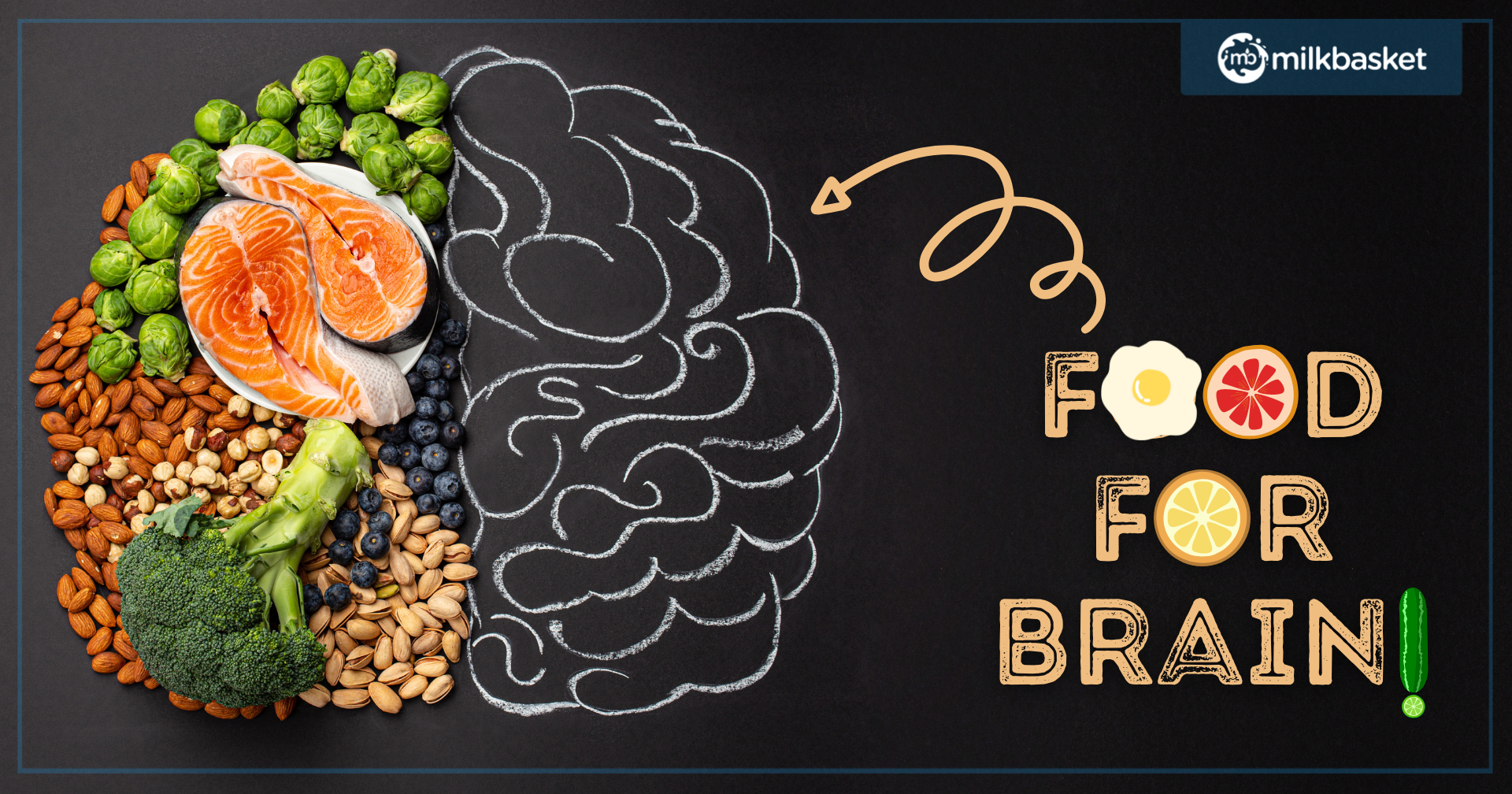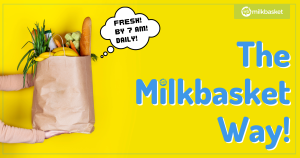Foods That Affect Your Mental Health And How
Ever wondered why we love eating so much?
We’ll tell you why! When we eat, we forget a lot of our problems, and our taste buds help us shift our focus to the quality of the meal. Thus, eating right and eating healthy is often regarded as a significant way to improve one’s mental health.
Today, across the world Mental Health conditions such as anxiety and depression have become very common. According to the World Health Organization (WHO), by 2030, depression could become the number one health concerns in the world. Therefore, the research on new ways to reduce the impact of varied mental health conditions is a continued process.
We can complain about the new era and its fast lifestyle being the cause of low maintenance of our health or we can abuse the power of this tech revolution and lifestyle to our own benefits. With facilities such as online delivery for fresh groceries and focus on prioritizing a healthy lifestyle.
Nutritional psychiatry is an emerging area of research in the field of mental health which is focused on the role of nutrition in development and treatment of mental health problems. The two main areas that researchers are pondering in relation to the role of nutrition in mental health are, “How helpful is diet to prevent mental health conditions?” and, “Are nutrition attentiveness helpful in the treatment or prevention of these conditions?”
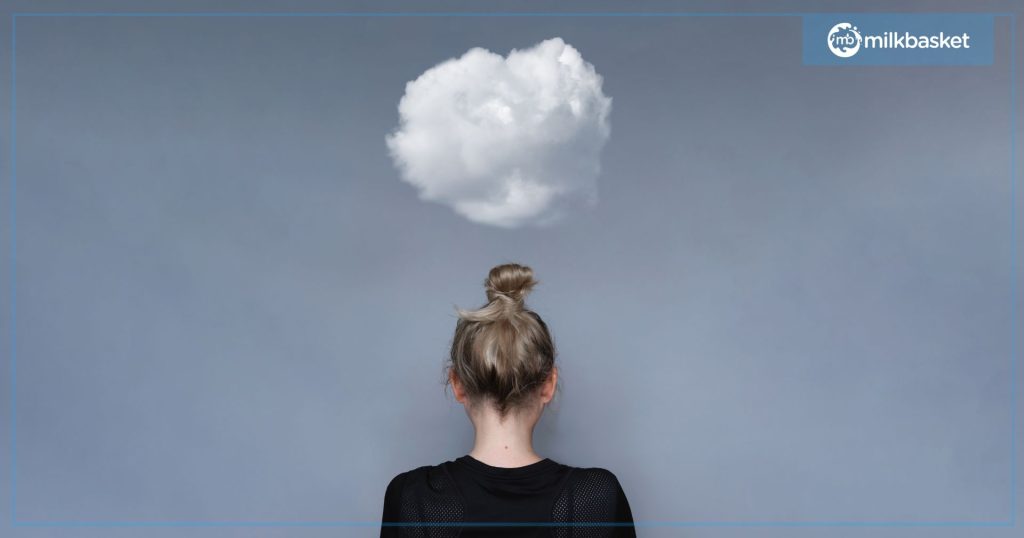
The Complexity Of Mental Health
Multiple factors can affect or influence an individual’s eating habits and mental health.
Some of these factors that can contribute to mental health conditions include biological factors, such as genetics, life experiences, and family history. Another major factor is socioeconomic status as it can completely transform the access to food and the overall diet quality.
Mental health also can in turn influence your eating habits. For example, people often turn towards less healthful foods when feeling angry or upset, such as sweets or highly processed snack foods. Similarly, many mental health medications such as the antidepressants and anti-anxiety medications can increase appetite and cravings. In both of these situations, struggling with medications or mood swings can make adhering to a healthy diet more difficult.
Overall, while a healthy diet may be an integral factor for mental health, it is important to remember that many other aspects of life can also contribute to changes in your mood just that easily.
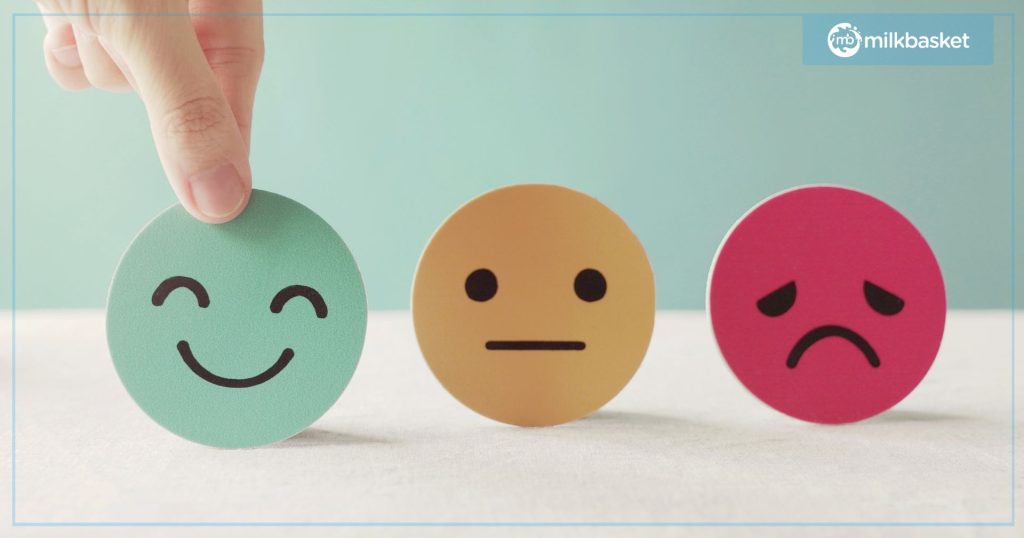
Food And Mood-The Scientific Interlink
The gastrointestinal tract is often called the ‘Second Brain’, and the reason is the close relationship between your gastrointestinal tract and the brain. This is why your food habits change your mood significantly.
Let’s dive into the science of this connection. Billions of bacteria inhibit inside your GI tract and hence, they influence the production of chemical substances, neurotransmitters that carry messages from your stomach to your brain. For example, serotonin and dopamine are parts of the brain’s reward system and hence the release of these chemicals result in making you happy.
Now how does a healthy diet come into play here? Eating healthy food promotes the growth of good bacteria, which automatically influences your neurotransmitter production. On the other hand, if your diet consists of junk and fast food, it will cause inflammation and will end up hampering neurotransmitter production.
This means that automatically in your body when your neurotransmitters are in good shape, it will receive positive messages from all around you. However, your brain will start to focus on all negatives the moment the production goes awry. Even though such foods would release the feel good hormone such as dopamine temporarily, that feeling won’t last long.
For example, if you are addicted to sugary beverages, it will increase inflammation and feed the harmful bacteria inside your GI tract while destroying your neurotransmitters.
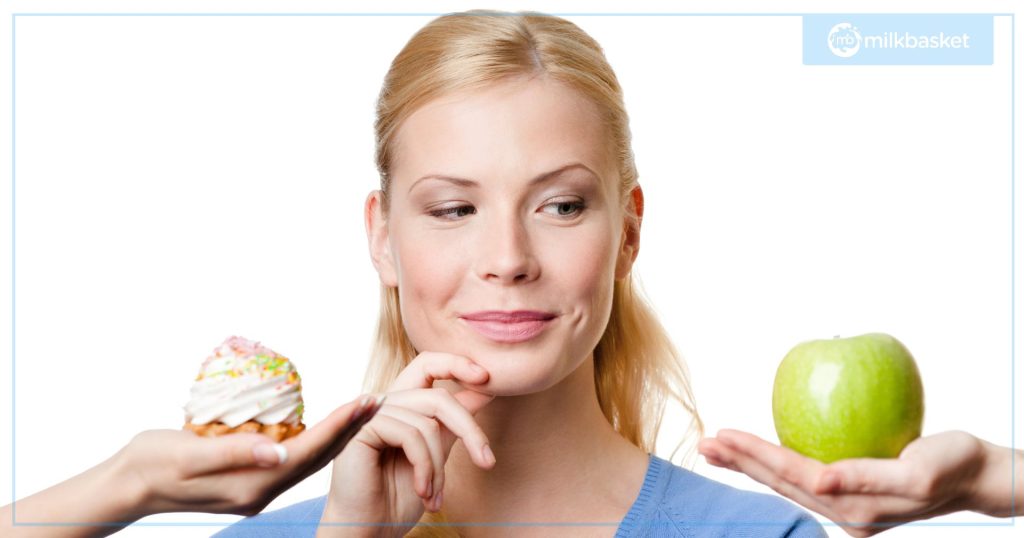
How What You Eat Affects Your Well Being?
The saga of what we eat and how it makes us feel is a complex relationship. However, one thing is for sure that your diet does impact the brain one way or another. You are most definitely aware about how some foods can make you feel better, and yup, we are talking about junk & fast food. However, when you eat highly unhealthy food like that, it doesn’t let your conscience slide for much longer.
For example, eating a Mediterranean healthy diet with lots of seafood, veggies, herbs, olive oil, and grain will scientifically make you feel good. This is because the fish oil reduces the symptoms of anxiety and depression, and that is how your gut will control the way you feel.
Hence, focusing on your wellbeing, you should probably include veggies, beans, fruits, and probiotics in your daily diet. You can get all this delivered at your doorstep every morning and eat fresh with our grocery delivery services at Milkbasket.
On the contrary, some feel good foods trick your brain into feeling happy, whereas they increase your chances of becoming unhealthy. For example, chocolate and caffeine supposedly relax us, but they are harmful for our minds as they keep us awake and increase our calorie intake.
The Big Question Is, ‘Why?’
There are several theories on how what we eat and our daily food habits may influence the mood or the risk of conditions such as depression and anxiety. Some scientists believe that one of the key ways to help explain the relationship between diet and mental health could be through the inflammatory effects of certain dietary patterns. So far researchers have found that several mental health conditions seem to have links with increased levels of inflammation inside the body.
For example, healthy diets, that is, diets associated with the benefits for mental health tend to be high in fruits, vegetables, whole grains, and healthful fats; all of which are foods that are rich in anti-inflammatory compounds. A review of observational studies even supports this theory, as diets high in antioxidants and anti-inflammatory foods were associated with a reduced risk of mental health disorders such as depression. You can use our impeccable online delivery service and get a customized grocery delivery at your house with all the nutrients you need in your diet.
Even after all this, the exact relationship between a healthy diet or food in general, inflammation, and alterations in mental health is not very well-understood.
Another possible explanation is that your diet may affect the bacteria in the gut, which is often referred to as the gut microbiome.
Did you know that an ongoing research has found a strong link between gut health and brain function. For example, the healthy bacteria in our gut produces the majority of neurotransmitter serotonin, which ends up affecting your mood greatly.
The health & diversity of the gut microbiome is greatly affected by one’s diet. And this theory is a promising explanation for how what we eat may be affecting our mental well-being with an unhealthy or healthy diet.
Finally, there is another possibility that diet plays a more indirect role in mental health. This possibility indicates that individuals with healthy diets are more likely to engage in healthy behaviors and habits that are in turn linked with a reduced risk of mental health conditions, such as engaging in regular physical activity or workouts, practicing good sleeping habits, and refraining from smoking or any kind of substance abuse.
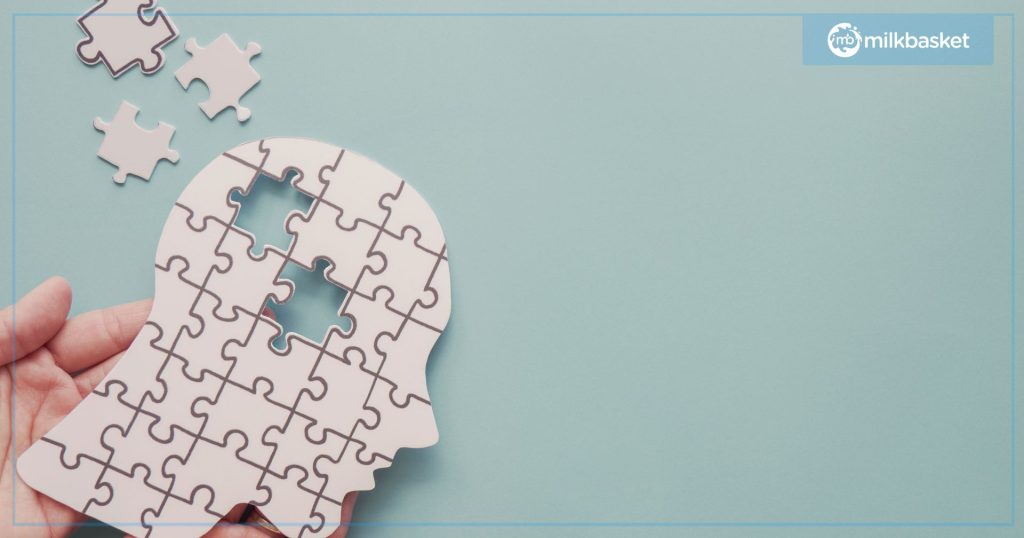
Prevention of Mental Health Conditions With Food:
Several observational studies have shown a link between overall diet quality and the risk of depression or other mental health disorders from various countries found that a healthy diet lifestyle is characterized by high intakes of fresh fruit & vegetables, whole grains, olive oil, fish, low fat dairy, and antioxidants, as well as low intakes of animal foods was associated with reduced risk of mental health conditions, especially depression.
On the contrary, a Western-style diet that involves high intake of red and processed meats, refined grains, sweets, high fat dairy products, butter, and potatoes, as well as a relatively low intake of fruit and vegetables was linked with significant increased risk of depression.
More recently, a study conducted to look at adults over the age of 50 years found a link between higher levels of anxiety and diets high in saturated fat and added sugars. Interestingly, researchers have noted similar findings in kids and teenagers as well.
However, it is important to note here and remember that while observational studies can show an association, they cannot prove cause and effect. Also, even with randomized controlled trials, there are several limitations when it comes to nutrition research studies, including difficulties with accurately measuring food intake which can affect the results greatly. Researchers often rely on participants recalling what they have eaten in previous days, weeks, or months, but no one’s memory is perfect for that.
Curing Mental Health Conditions with Food
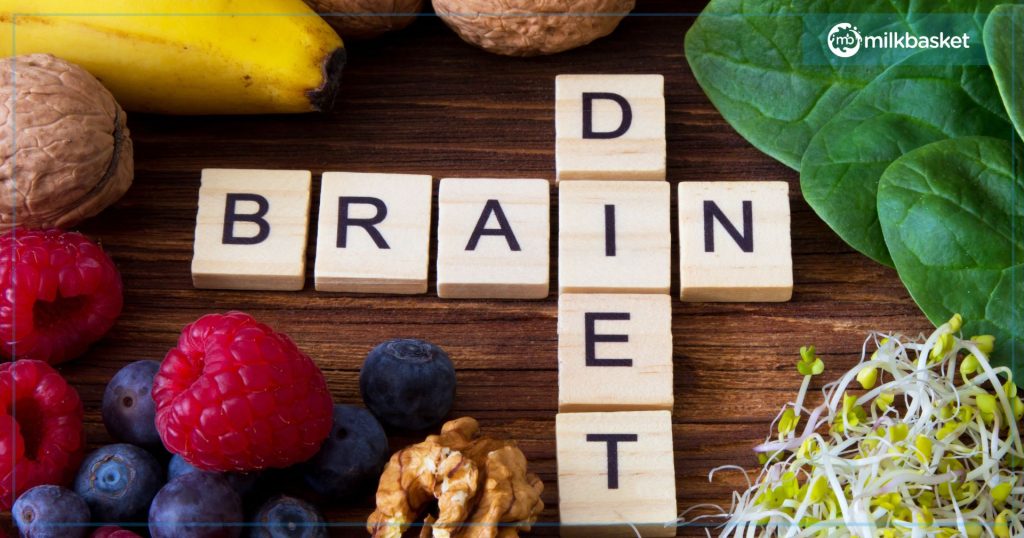
Protecting your mental health by incorporating good food on your platter has been considered one of the best ways. If you don’t eat healthily, and are regularly indulging into unhealthy junk foods, you will soon require mental health treatment, which may not be a suitable and affordable strategy for everyone.
Let’s dive into the good & healthy foods for us and once you are done noting down all that you need for a healthy lifestyle, just relax get an online delivery of all your needs with Milkbasket.
1: Whole Foods
Whole foods are the category of naturally processed foods that are free from additives, preservatives, and food colors can cause hyperactivity in people, which leads to depression. This is why you should always eat whole foods such as fresh veggies and fruits as they are filled with healthy ingredients.
2: Fiber
The powerhouse of fiber is – Vegetables! If you want to eat fiber, you should eat lots of vegetables as these fibers help your body absorb glucose more slowly, and thus you don’t get the sugar rush. So, for example, whole grains, fruits, vegetables, and nutrient-filled carbs like beans are good foods for a fiber inclusive diet.
3: Antioxidant
Antioxidants are your best friends when it comes to a healthy diet. They are super inflammation fighters. You can find them in abundance if you eat berries, leafy green veggies, turmeric, black chia seeds, salmon, and food that is at risk from Omega 3 Fatty acids. Even foods like sugar and dark chocolate contain antioxidants, but looking at their adverse health effects you must eat them in moderation.
4: Vitamin B
This is one of the most common deficiencies in people today . If you eat cantaloupes, leafy green veggies, and lentils, you will consume ample Vitamin B, which will in turn help in secretion of dopamine. Unlike foods like sugar that trick your mind into being happy, vitamin B will genuinely cheer your mind up, so it’s a safe & healthy option to protect your mental health.
5: Vitamin D
We’ve all heard the need of Vitamin D to boost immunity amongst the spread of pandemic in 2020. You must know that vitamin D helps in the production of serotonin, and the best source to get it naturally is to stand under the sunlight. However, eating mushrooms such as reishi, cordyceps, and maitake also help in consuming vitamin D, and if you don’t like any of these modes of consumption, you can always take doctor-prescribed supplements as required by your body.
6: Magnesium
If your diet doesn’t contain enough Magnesium, it will cause anxiety and depression. Food that’s rich in magnesium promotes a healthy heart to stay strong and aids your nerves and muscles to function correctly. This is why you must eat foods like cacao nibs, dark chocolate, cashews, almonds, dark leafy greens, beans, and bananas.
7: Fermented Food
We’ve all heard the word – probiotic. Now let’s learn how to consume and why it’s important. Fermented food is rich in probiotics, and thus it will help good bacteria inhibit your GI tract. The fermented drink, Kombucha, kimchi, miso, sauerkraut, tempeh are some examples of fermented food. They are also high in sodium, and hence will stabilize your blood pressure as well.
Conclusion
The connection between mental health & a healthy diet is inevitable. The phrase ‘We are what we eat’ is now proven with scientific backing in order to make the masses understand the adverse effects of their bad choices in food & lifestyle.
One of the biggest health impairments is society’s dependency on processed foods. These foods are high in flours and sugar and train the brain to crave more of them, rather than nutrient-rich foods such as fruits and vegetables.
Most processed foods that we eat are highly addictive and stimulate the dopamine (feel good hormone) centers in our brain, which are associated with pleasure and reward. And there is only one way to stop eating unhealthy foods, that is to stop eating them completely! You actually start to change the physiology in the brain when you remove added sugars and refined carbohydrates from your diet.
Having said that, it is highly important for anyone who is experiencing depression or anxiety symptoms or has any general concerns about their mental well-being to work with a trusted healthcare provider to develop a personalized treatment plan.
Mental Health is way too complex to be concluded with one food item to prevent disorders. Mental health is not one good meal, it’s a lifestyle of good choices. Embark on the journey of protecting your mental health today with Milkbasket. Order all the healthy foods & fresh fruits & vegetables with us and get the grocery delivery at your doorstep. Step into the world that’s stress-free with us!
Categories
Popular Posts
-

4 Eco-Friendly Decorations for Ganesh Chaturthi
Spread the loveLooking for sustainable eco Ganpati decoration ideas as Ganesh Chaturthi approaches on August 26, 2025? You’re not alone in wanting to celebrate Lord Ganesha while protecting our environment. This festival season, you can create beautiful decorations that honor tradition without harming the environment. Milkbasket understands your need for convenient online grocery delivery during […]
19 Aug 2025 read More... -

Milkbasket – A Revolution In The Online Grocery Delivery Services In India
Spread the loveThere’s no denying the fact that the pandemic has drastically changed the way people spend their time online, buying everything through various online retail platforms with the convenience of home deliveries in India. Milkbasket, with it’s features has proven to be a revolution in the online grocery delivery services in India. While stepping […]
08 Jul 2022 read More... -

Milkbasket’s Latest DVC Campaign Is Out, And It’s Quirky And Relatable As Heck!
Spread the loveThe year 2021 was all about patience, resilience, and the grind it takes to get back up from a worldwide slump that the COVID-19 pandemic had hit us with. It made us all revisit our roots, recalibrate our priorities, and strengthen our foundations. With the better part of 2022 gone into slowly spreading […]
28 Sep 2022 read More... -

Nabhi Chikitsa or Belly Button Therapy: The Simple Health Secret You NEED To Know!
Spread the loveOur Navel or Belly Button (scientific name Umbilicus) is believed to be the centre of our life force. Most of us take it as just another part of our body not knowing its deep, thrilling world. In ancient Hindu healing practices, the Navel is considered to be the most important point of the […]
08 Sep 2022 read More...

